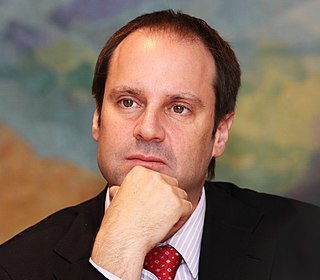A Quote by Amanda Palmer
I maintain couchsurfing and crowdsurfing are basically the same thing — you're falling into the audience and you're trusting each other.
Related Quotes
The leaves are falling, falling as if from far up,as if orchards were dying high in space.Each leaf falls as if it were motioning "no."And tonight the heavy earth is fallingaway from all other stars in the loneliness.We're all falling. This hand here is falling.And look at the other one. It's in them all.And yet there is Someone, whose handsinfinitely calm, holding up all this falling.
Subjects who reciprocally recognize each other as such, must consider each other as identical, insofar as they both take up the position of subject; they must at all times subsume themselves and the other under the same category. At the same time, the relation of reciprocity of recognition demands the non-identity of one and the other, both must also maintain their absolute difference, for to be a subject implies the claim of individuation.
The secular utopians basically said the exact same thing, they just took the Bible out of the equation. The religious and the secular groups recognized each other as fellow travellers. They exchanged newsletters and asked each other questions like, "What's a good soup pot to use if you're making dinner for 800 people?" They had these practical connections.
We need each other to do things that we can't do for ourselves. If we are intimately connected with each other, we just give things to each other; if we don't know each other we find another way to handle it. If you think about it, each according to his or her abilities and each according to his or her needs is sort of the same thing as supply and demand.
Another option, which I think is the thing that makes more sense, is this fact that the police are a reflection of the occupation of certain neighborhoods and certain parts of cities that are designed, basically, to keep the bottom down and basically maintain the status quo, but out of sight, so that the other side - the people in power, the people with money, the people with comfort, the people that are living in the "safer" areas - are sure that they can sleep safely in their bed while bad thing are happening to people and it's not their problem.
There never is any such thing as one truth to be found in dramatic art. There are many. These truths challenge each other, recoil from each other, reflect each other, ignore each other, tease each other, are blind to each other. Sometimes you feel you have the truth of a moment in your hand, then it slips through your fingers and is lost.
Then, without any warning, we both straightened up, turned towards each other, and began to kiss. After that, it is difficult for me to speak of what happened. Such things have little to do with words, so little, in fact, that it seems almost pointless to try to express them. If anything, I would say that we were falling into each other, that we were falling so fast and so far that nothing could catch us.
I wrote an op-ed piece in The New York Times about the amazing effect of shared wonder - how I have an audience filled with people who you'd think would hate each other, people from every religious category, all at the same show at the same time. And it's an amazing phenomenon to watch this shared sense of wonder, where these people who really don't like each other - for good and bad reasons, reasons that make sense and that don't make sense - are in the same room, experiencing this unification.




































